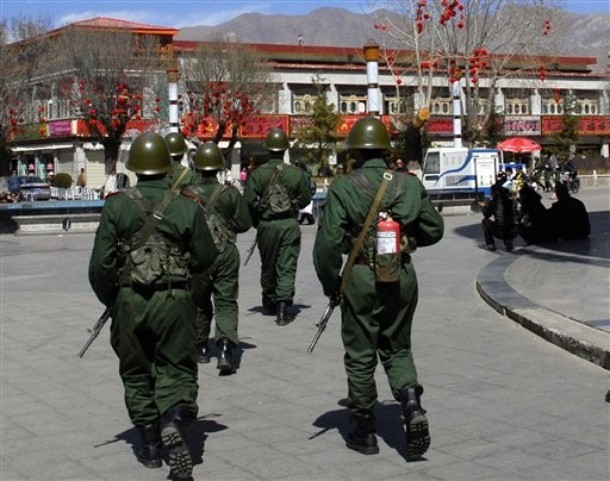 China has tightened security and is banning foreign tourists from travelling to Tibet before the National Day military parade on October 1. According to reports also the foreign media in China have come under various attacks.
China has tightened security and is banning foreign tourists from travelling to Tibet before the National Day military parade on October 1. According to reports also the foreign media in China have come under various attacks.
China has tightened security in Tibet in recent weeks, putting thousands of extra police on the streets ahead of the festivities in Beijing marking the 60 years of Communist rule which will include a military parade, fireworks and mass performances at Tiananmen Square. "Passes for foreign travellers to enter Tibet will be suspended from September 24 to October 8. Those who have already arrived will be allowed to stay", says Tan Lin, a Chinese woman staffer at the so called official Lhasa Tourism Bureau.
State media reported on Monday that outgoing flights would be halted at Beijing's airport during the parade, and retailers have said they have been banned from selling kitchen knives after two recent stabbings near the square.
Similarly, there have been attacks on foreign media and journalists in China during the recent weeks. While three journalists from Japan's Kyodo news agency were beaten up and their two computers destroyed last Friday in their hotel room the latest wave of attacks came on the internet with several foreign media being targeted by emails with malicious computer software. According to Reuters, while spam mails and viruses are not uncommon the latest attack tries to tempt foreign reporters to open infected attachments.
"There is definitely a pattern of virus attacks in the run-up to important dates on the Chinese political calendar," Nicholas Bequelin of Human Rights Watch in Hong Kong told Reuters. He noted that non-government organizations are also favourite targets. "Whether the government is behind it, closes its eyes to it, supports it or has nothing to with it is unclear. There are also patriotic hackers, so there is no way to know for sure who is behind it".
China has previously banned foreign tourists from visiting Tibet, including after deadly crackdowns across the Tibet in March 2008. China also barred foreigners, particularly foreign journalist in March of this year during the tense 50th anniversary of a failed 1959 uprising against China that sent the Dalai Lama, the Tibetan spiritual leader, into exile. Similar cyber-attacks through email were common ahead of the Beijing Olympic Games last year.
Since March 2008 over 220 Tibetans have been killed, 1,294 injured and 290 sentenced, more than 5,600 were arrested or detained and over 1,000 disappeared after the Chinese armed military deadly cracked down in all parts of Tibet. Newly minted warrants and ramped up security forces make life increasingly more difficult for Tibetans to live inside of Tibet. China's human rights violations are swept under the "rug" of propaganda because foreign journalists are highly restricted throughout Tibet.


![Tibet has a rich history as a sovereign nation until the 1950s when it was invaded by China. [Photo: File]](/images/stories/Pics-2024/March/Tibet-Nation-1940s.jpg#joomlaImage://local-images/stories/Pics-2024/March/Tibet-Nation-1940s.jpg?width=1489&height=878)















